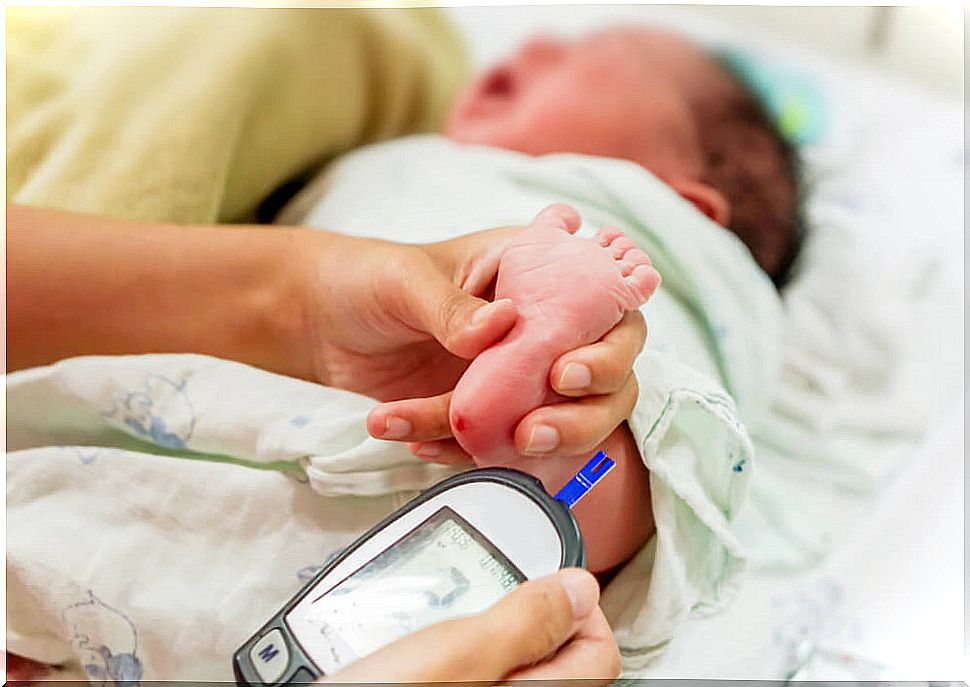Hypoglycemia In The Newborn

Hypoglycemia in the newborn is a decrease in blood sugar. The amount of glucose is less than 50 mg / dL, the minimum necessary to be at normal levels. During pregnancy, the baby gets glucose from the mother; at birth, it receives it through milk and, in turn, produces its own levels in the liver.
Glucose is the main fuel for the proper functioning of the brain. The newborn obtains the necessary energy and its continuous deficiency can have serious consequences. It is detected by a test of blood taken from the heel. The doctor should carry out tests after a few hours to verify the balance in the sugar levels.
What are the symptoms of hypoglycemia in the newborn?
It is likely that no symptoms are visible, or that your glucose levels are not correct. Similarly, with some results, it is necessary to repeat the tests.
These are some symptoms that our little one may have problems with very low blood sugar:
- Alterations in the rhythm of the baby’s breathing.
- Changes in the color of the skin, detecting a bluish tone or sudden paleness.
- Decrease in body temperature.
- Milk intolerance, vomiting.
- Presence of sweat, tremors or seizures in the most severe cases.
- More irritable or nervous mood.

When is there an increased risk of hypoglycemia in the newborn?
There are a few factors that are considered a possible cause of hypoglycemia:
- Premature babies or too small for their gestational age.
- Newborns with gestational diabetes. They are generally one size larger than the average child.
- Children of mothers with diabetes who begin to process glucose on their own.
- Children with liver deficiencies that fail to produce the necessary levels of sugar in the liver. One of the most serious cases occurs with the incompatibility of blood between mother and child.
- Newborns with feeding difficulties.
- Deficiencies in maternal nutrition during pregnancy.
- Disorders that cause a high consumption of glucose stores.
- Diseases that affect the digestive system and metabolism.
How is hypoglycemia in the newborn treated?
We must try to ensure that the baby receives a greater amount of sugar by increasing the dose of milk. In some cases, it is very positive to reinforce the mother’s milk with nutritional supplements. Likewise, there are sugary solutions that are administered orally.
When blood sugar levels remain below normal, medications are used. The tests are repeated periodically to monitor progress ; in extreme cases, the child undergoes pancreas surgery.
What are the likely prognoses for hypoglycemia in the newborn?
In the simplest cases, it is possible to reverse the situation with a treatment of a few days. Likewise, we must be vigilant and control that the glucose level does not drop again after having finished said treatment.

In children with a more severe condition, it can lead to seizures. It is also believed that in these children the learning process is slower. Hypoglycemia does not affect IQ, but it does have an impact on mental development. This effect is especially visible in preschool-age children.
To avoid these problems in the future, it is essential to detect and treat the disease early. If you have any doubts or symptoms, ask your pediatrician to repeat the analysis to be sure.
Can hypoglycemia in the newborn be prevented?
There are no specific vaccines or methods for preventing low blood sugar. However, certain care during pregnancy can be of great help to reduce the risks:
- It is necessary to maintain a healthy diet in the gestational period rich in nutrients and vitamins
- Future diabetic moms must have an exhaustive control of their sugar level and also have accurate information on these levels in the child when it is born
- Find complementary methods of baby feeding when breast milk is insufficient
Hypoglycemia in the newborn is a more common condition than imaginable. Its diagnosis is very simple and it is always advisable to use laboratory analysis. There are other methods, such as bands, but the traditional mechanism is better. Following the instructions of professionals is the best way to help the baby.










